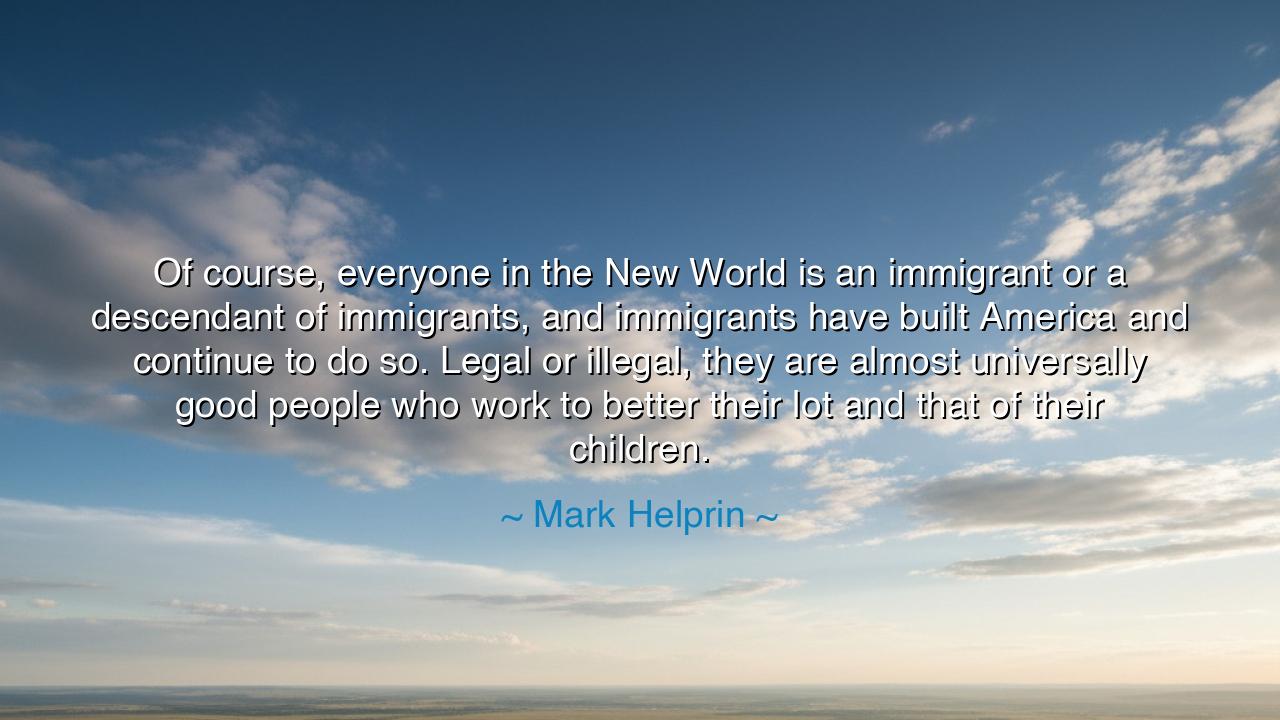
Of course, everyone in the New World is an immigrant or a
Of course, everyone in the New World is an immigrant or a descendant of immigrants, and immigrants have built America and continue to do so. Legal or illegal, they are almost universally good people who work to better their lot and that of their children.






Hearken, O seekers of wisdom, to the words of Mark Helprin, who wrote with a voice both tender and resolute: “Of course, everyone in the New World is an immigrant or a descendant of immigrants, and immigrants have built America and continue to do so. Legal or illegal, they are almost universally good people who work to better their lot and that of their children.” These words are not merely an observation—they are a hymn to human courage, a tribute to the ceaseless striving that has carried civilization across oceans, mountains, and generations.
From the beginning of time, humankind has been a wandering race. The earth itself is a map of migration, written in footsteps and hope. The ancients crossed deserts seeking water; the sailors of the Renaissance crossed the seas seeking freedom; the poor of Europe crossed the Atlantic seeking dignity. In Helprin’s view, the story of America—and indeed, of the New World—is the story of this migration made sacred. Every home, every road, every farm and city stands upon the labor of those who dared to begin again in a strange land.
Helprin’s words remind us that immigration is not a matter of mere politics, but of the human spirit. The immigrant, whether sanctioned by law or condemned by it, embodies the oldest of virtues—hope, work, and sacrifice. The law may divide them into categories, but the heart of their struggle is one. When he writes that they “work to better their lot and that of their children,” he speaks to a truth that transcends nationality: that every parent, every worker, every dreamer labors not only for themselves, but for those yet unborn.
History is rich with examples of this truth. Recall the tale of Andrew Carnegie, who came to America a poor boy from Scotland, working as a bobbin boy in a factory for a dollar and twenty cents a week. Through perseverance, he became one of the great builders of the American steel industry—and, in his later years, a benefactor of libraries, schools, and peace foundations. His journey mirrors the collective story of countless others: that immigrants do not simply come to partake—they come to build, to add, to transform.
When Helprin acknowledges both legal and illegal immigrants with equal compassion, he challenges us to look beyond the boundaries drawn by law and into the realm of morality and gratitude. For what is legality but a construct of time and circumstance? Laws change, but the nobility of human endeavor endures. The field hand who harvests crops in silence, the mother who labors unseen to feed her children, the craftsman who builds homes for others—these are not trespassers but torchbearers of civilization’s continuity.
Yet, Helprin’s tone is not one of sentimentality; it is one of moral realism. He does not romanticize the immigrant but honors their goodness—the quiet, uncelebrated virtue of those who persist without complaint. His statement reminds us that the greatness of nations does not arise from the comfort of the powerful but from the toil of the humble. The New World, he insists, remains ever new because it is perpetually renewed by those who come seeking a fair chance, bearing the courage of reinvention.
From these words emerges a lesson of enduring power: remember your origins. Whether your forebears came centuries ago or yesterday, your life rests upon the courage of those who moved forward into the unknown. Let gratitude replace prejudice, and empathy replace division. For in honoring the immigrant, we honor the very spirit that built our cities, tilled our soil, and defined our humanity.
O children of the future, let this teaching dwell in your hearts: to build a world worthy of its founders, you must treat the newcomers not as strangers, but as the continuation of your own story. For every nation, every civilization, is but a community of immigrants—and when we forget that, we lose the essence of who we are.






AAdministratorAdministrator
Welcome, honored guests. Please leave a comment, we will respond soon